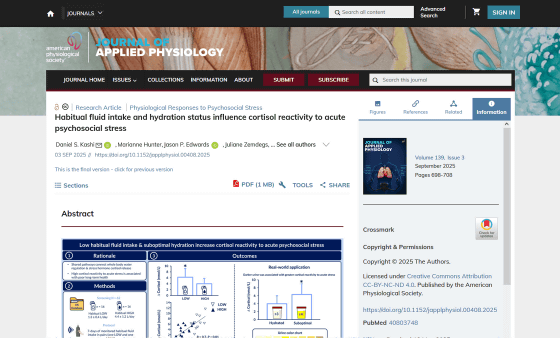Staying hydrated may be key to managing stress

While proper hydration is essential to maintaining bodily functions, and frequent sipping of water is recommended, especially on hot days, new research suggests that hydration may also be necessary to cope with everyday stress.
Habitual fluid intake and hydration status influence cortisol reactivity to acute psychosocial stress | Journal of Applied Physiology | American Physiological Society

Hydration may be your best defense against stress, new study shows
https://theconversation.com/hydration-may-be-your-best-defence-against-stress-new-study-shows-263361
Previous research has shown that people with low fluid intake are at increased risk of kidney disease, cardiovascular disease, and metabolic disease. Furthermore, because the body's fluid regulation function is connected to the same pathway as the secretion of the stress hormone cortisol , it is possible that fluid intake and cortisol secretion are related.
A research team led by Daniel Carthy, a postdoctoral researcher at Liverpool John Moores University, investigated the fluid intake habits of healthy adults aged 18 to 35 and divided them into two groups: those who drank less than 1.5 liters of fluid per day and those who drank more than 2.5 liters of fluid per day for women and more than 2.9 liters of fluid per day for men.
Participants in each group were asked to keep a daily beverage record for one week to ensure the classifications were accurate. This included all fluid sources, including juice, milk, diet drinks, and alcohol. Urine samples were also collected to assess body fluid balance based on urine osmolality .
Once eligible for group assignment, participants were sent to a lab to complete stress tests, which included tasks like public speaking and mental arithmetic. The researchers then collected samples of the participants' body fluids and measured their cortisol levels before and after the stress tests.

The study found that participants in both the high- and low-hydration groups reported similar feelings of tension and had similar heart rates during the stress test, but those in the low-hydration group experienced a more pronounced rise in cortisol levels during the stress test. This suggests that chronic dehydration may make it harder for the body to cope with stress.
Surprisingly, participants who drank less fluid reported feeling just as thirsty as those who drank more fluid, but their urine was more concentrated, indicating their bodies were dehydrated, suggesting that thirst is not necessarily an indicator of the need for fluid intake.
The phenomenon of dehydration amplifying stress is related to the hormone
'While vasopressin helps conserve precious fluids, it also heightens the body's stress response,' Carthy and his colleagues wrote. 'For people dealing with daily pressures like work deadlines, family responsibilities, and financial worries, this exaggerated response can, over time, lead to serious health problems.'

While this study was based on laboratory stress tests in young subjects and does not fully replicate the complex psychological and social stressors experienced in the real world, it does suggest that a common intervention such as proper hydration may be useful in today's world, where chronic stress is a growing social problem.
'Health comes from a series of everyday choices, not dramatic interventions,' Carthy et al. said. 'While proper hydration won't eliminate life's pressures, it may help your body cope with them better.'
Related Posts:
in Science, Posted by log1h_ik







